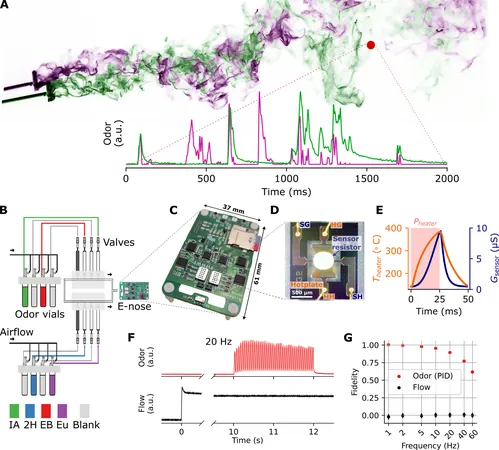
Revolutionary Portable 'Electronic Nose' Developed: Beats Mice in Odor Detection!
2024-11-20
Author: Arjun
In a groundbreaking development, researchers from the University of Hertfordshire, in collaboration with teams from University College London, the Francis Crick Institute, and Western Sydney University, have unveiled a miniature high-speed electronic nose that is smaller than a credit card but packs a powerful punch.
This innovative device can identify and decode a variety of odors within mere tens of milliseconds—outpacing even the remarkable capabilities of real mice.
Published in the prestigious journal Science Advances, the research highlights a significant leap in robotic olfaction technology.
While it's known that mice can distinguish odors at frequencies of up to 40 Hertz—a skill vital for their survival to detect nearby food sources or predators—this new electronic nose matches and exceeds these benchmarks.
In rigorous testing, the device successfully identified short pulses of odors such as pineapple, banana, eucalyptus, and cheese, outperforming its biological counterparts in rapid odor differentiation.
This advancement could lead to multiple high-impact applications, including improved monitoring of gas leaks, fire detection, and explosives identification, making it an invaluable tool for both industrial and environmental scenarios.
Lead researchers Nik Dennler and Professor Michael Schmuker explained that previous artificial olfaction technologies were hindered by being slow, bulky, or power-hungry.
Their team overcame these limitations through a sophisticated temperature control system that enhances sensor precision, even in the most turbulent environments.
The potential of this electronic nose extends beyond simple odor detection; it heralds a new era for robotics.
Picture drones or robots equipped with this technology to locate hazardous materials or track environmental changes rapidly.
We see this as a promising opportunity, not just for monitoring applications but also for neuromorphic computing,” said Dennler, emphasizing the inspiration drawn from the human brain to create low-power, high-speed AI systems.
This remarkable advancement in electronic olfaction systems demonstrates the capability of discerning odors with previously unattainable precision in a compact and efficient format.
The implications could reshape various industries and even aid in safety and environmental protection efforts.
The future of odor perception is here, and it is electronic!


 Brasil (PT)
Brasil (PT)
 Canada (EN)
Canada (EN)
 Chile (ES)
Chile (ES)
 España (ES)
España (ES)
 France (FR)
France (FR)
 Hong Kong (EN)
Hong Kong (EN)
 Italia (IT)
Italia (IT)
 日本 (JA)
日本 (JA)
 Magyarország (HU)
Magyarország (HU)
 Norge (NO)
Norge (NO)
 Polska (PL)
Polska (PL)
 Schweiz (DE)
Schweiz (DE)
 Singapore (EN)
Singapore (EN)
 Sverige (SV)
Sverige (SV)
 Suomi (FI)
Suomi (FI)
 Türkiye (TR)
Türkiye (TR)